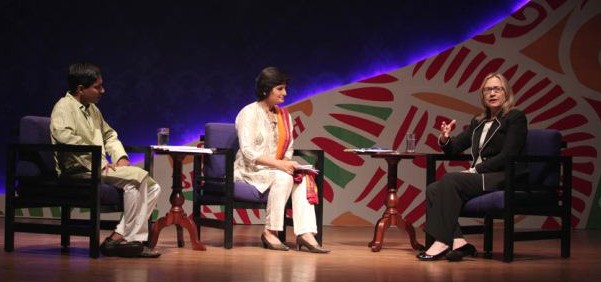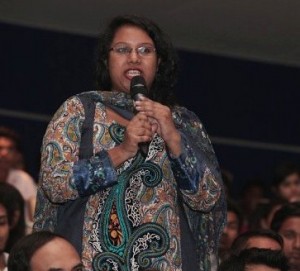Nausheen Khan ’11 asks Secretary Clinton about Developing Nations and Climate Change
 When U.S. Secretary of State Hillary Clinton visited Bangladesh on May 5, 2011, she sat down with up and coming youth leaders from across the country. Nausheen Khan ’11 was one whose question Secretary Clinton answered. Here’s the transcript:
When U.S. Secretary of State Hillary Clinton visited Bangladesh on May 5, 2011, she sat down with up and coming youth leaders from across the country. Nausheen Khan ’11 was one whose question Secretary Clinton answered. Here’s the transcript:
NAUSHEEN KHAN: Hello. Welcome to Bangladesh. My name is Nausheen Khan, and I’m a recent graduate of Mount Holyoke College, and I’m working at a development organization called Khan Foundation. So we know that Bangladesh is one of the lowest contributors to carbon emissions, but it’s the worst affected by climate change. So I would like to know, Madam Secretary, what initiatives or what commitment is the U.S. planning to make at the upcoming Rio+20 conference that would help Bangladesh or other developing nations to tackle this challenge, either financially or in other means? Thank you. [Applause.]
SECRETARY CLINTON: Well, thank you. And congratulations on your graduation. I also graduated from a women’s college in the United States, called Wellesley. And so Mount Holyoke and Wellesley are what we call seven sisters; we’re two of the sisters.
You’re right. Climate change is one of the biggest threats to low-lying countries like yours, to island nations across the oceans. So we are particularly focused on seeing what we can do to help, and here are a couple of things. I also announced yesterday a grant to work between our research institutions and yours, $17 million over the next few years, to think of ways that we can help mitigate the effects of climate change here in Bangladesh ? how we use technology, what kind of agricultural practices, what kinds of other responses to rising waters, or the effects of increasing and intense ? intensity of storms, and all of the issues that we are studying together.
We are looking to figure out ways to actually put into practice the fund that has been agreed to with the large economies, making contributions to try to help countries that are at risk. But among the challenges we face is to make sure we all know what works best, because as we try to reduce emissions, we still have to deal with the dangers that you are facing at the same time. So that’s why this grant to work with you is so important.
The other thing I have just started–and Bangladesh was a charter original member–is something called the Climate and Clean Air Coalition to prevent short-lived polluters–pollution like methane or black carbon or soot. And we are working with a small but growing group of countries–Bangladesh, Sweden, Canada, Mexico, the United States, and others–to take action on these pollutants while we still work on carbon dioxide, because they’re about 30- to 40 percent of the problem with greenhouse gas emissions.
And there are ways of attacking those right now. For example, Bangladesh has joined something that we are sponsoring called the Global Alliance for Clean Cookstoves, because the way that women in the developing world cook the food for their families kills 2 million women and children a year because of respiratory distress and diseases, and pollutes the atmosphere. So we are working to try to develop clean cookstoves that will then be made available through organizations like Grameen Bank or BRAC so that we can help cut the pollution and improve the health.
So there are numerous ways we are working directly with your country, and then more generally, in preparation for Rio+20, looking for how we’re going to build on the commitments of Copenhagen, Cancun, and Durban, where for the first time, developed and developing countries together said we all have to work to limit climate change. So we’re working at it. It’s a very difficult, long-term challenge. In the United States, we’re increasing gas mileage for cars; we’re cleaning up coal-fired power plants; we’re working on a number of areas, even though we don’t have an overarching, comprehensive legal framework. That was not possible with our Congress, but President Obama is continuing to make progress despite that. [Applause.]
Nausheen Khan ’11 works at the Khan Foundation, a non-government organization, as a research associate. Khan Foundation has been working in the areas of democracy, governance, and human rights for the past two decades.
May 8, 2012








Leave a Reply